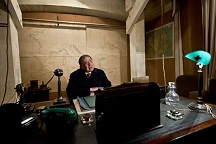Michael Hastings and George Little are our guests this week.
Show produced by Katherine Caperton.
Original Air Date: January 16, 2013 on SiriusXM “POTUS” Channel 124.
Polioptics airs regularly on POTUS on Saturdays at 6 am, 12 noon and 6 pm.
Follow us on Twitter @Polioptics Listen to the show by clicking on the bar above.
Show also available for download on Apple iTunes by clicking here
On our show this week, Panic and The Pentagon.
They are two separate things.
Panic is a new e-book — fully titled Panic 2012: The Sublime and Terrifying Inside Story of Obama’s Final Campaign — by Rolling Stone contributor and Buzzfeed correspondent Michael Hastings.
The Pentagon is a big building in Arlington, Virginia completed in 1943 with over 6,600,000 feet of floor space. It’s where the outgoing Secretary of Defense, Leon Panetta, and his press secretary, George Little work, along with, oh, about 30,000 other military and civilian employees. No panic there that I’m aware of.
What I am aware of, however, is that on one program we have one of the most accomplished and skilled spokespeople for a government agency working today and, in our other segment, a journalist of the new generation unafraid to burn bridges with the press shops of The White House, Pentagon and Foggy Bottom. Witness: “The Runaway General” and the email exchange with Philippe Reines.
I’m conscious, too, that I do the Polioptics show more as a hobby than anything else, and that my P.R. lineage is linked closer to George Little and Philippe Reines than Michael Hastings. But when I reflect on the roles that all three men play in the daily dispensary of information that is Washington, I’m glad that they’re each hard at work, performing their respective roles at the height of their craft.
* * *
One of the earliest books that I read on political combat, and the unique strain of war correspondents that cover it, was Fear and Loathing: On the Campaign Trail ’72 by Hunter S. Thompson. From another branch of the campaign reportage pantheon, Adam Belmar and I paid homage a few weeks ago to Richard Ben Cramer, who wrote What It Takes: The Way to the White House.
 Michael Hastings’ new book — and his distinctive prose practiced in his other notable works of long form journalism — echoes Thompson and Cramer in tone and damn-the-torpedoes willingness to call it like he sees it, no matter through what prism the writer might be jotting in his notebook or viewing the screen as he types.
Michael Hastings’ new book — and his distinctive prose practiced in his other notable works of long form journalism — echoes Thompson and Cramer in tone and damn-the-torpedoes willingness to call it like he sees it, no matter through what prism the writer might be jotting in his notebook or viewing the screen as he types.
As you read Panic 2012, Hastings assumes you know the nomenclature of the presidential campaign apparatus and the cast of characters that populate it. If you don’t, tough shit, that’s why you have Mr. Google on hand. Strap on your seat belt for an accelerated takeoff of Air Force One, because the drama Hastings lays out it comes at you fast and furious.
Along with the trio of e-books already published from POLITICO that spanned the distinct epochs of the 2012 cycle, from primary season to the general election, Hastings’ offering, courtesy of Buzzfeed, is an enterprising experiment the future of publishing. He tells Adam and me that the most crucial period of his work came in the ten days that followed Election Day on November 6, when he and two assistants fanned out to conduct 40+ interviews with top Obama operatives while they were at their height of chattiness and their memories of crucial moments was sharp, before the hangover of the 44th President’s reelection wore off.
Now, less than three months after Governor Romney’s concession, Hastings’ book is available online. It’s a quick read, and it costs you five bucks. But that’s a lot of information for the money, and still many months before you see Game Change II from Halperin and Heilemann make its way to Amazon. Will our interest in Mitt Romney and the manner in which his campaign tried to communicate its message on the night of the Benghazi attack still interest us at the end of this year? Hastings isn’t taking that chance. He wants us to read it now, while it’s fresh and hot.
Chronicling the last few months of the 2012 campaign, with enough flashbacks, backstories and diversions to take you on a long, strange trip through recent American history, Panic 2012 is like sitting through a back-to-back weekend screening of a season or two of Aaron Sorkin’s WEST WING. You might not understand every word, reference or phrase, but you’ll feel you have your own suite at a shitty campaign hotel or a seat in the editing bay of an Obama attack video looping session.
* * *
Working in the White House during the first year of the Clinton Administration was a wonderful mess. There were botched events, mishandled appointments, and who could forget Travelgate?
Our sloppiness subsided when Leon Panetta, President Clinton’s first budget director, moved across West Executive Drive to take over as the president’s second Chief of Staff. Leon was a pleasure to work for — gracious, funny and decisive. He was also very supportive of the work we were doing, particularly in the run-up to the 1996 reelection, to improve the way that Bill Clinton was produced on stage.
My fondest memory of Leon was one shared by many, and it came before he became COS, while he was still budget director. It was a trip to Europe, the most memorable of our many trips over the years, as we were commemorating the 50th Anniversary of D-Day in 1994. It was ten years after Reagan had hailed the Boys of Pointe du Hoc, but still a time when the WWII veterans were hail, hearty and plentiful and the term Greatest Generation hadn’t yet been coined.
We were in Rome on June 2, the first country on our trip which would also take us to England and, later, to France, for the headline moment on Normandy Beach, which I’ve written about extensively in “The Story of Polioptics.”
But in Rome, early on in the trip, it was still joyous and fun. Former Boston Mayor Ray Flynn was Ambassador to the Vatican. I got to meet Pope John Paul II, who gave me the Papal equivalent of a challenge coin. And Prime Minister Silvia Berlusconi, who seemed, at the time, like just another orange-faced media mogul than a Mussolini-sympathizing spokesguy for Cialis, accompanied us everywhere.

Piazza Del Campidoglio — excellent rally site
One of the stops on our schedule was Michaelangelo’s Piazza del Campidoglio, which I had scouted as a speech location, along with other members of our site survey team, several months before. It was a beautiful summer afternoon, a few weeks before the solstice.
This would be one of those early evening “magic hour” open air addresses, when the afternoon sun splashes a golden glow on the speakers on the stage, made more beautiful still by the backdrop of the white Italian Campidoglio marble against which the president and the other speakers offered their remarks.
But this wouldn’t be any ordinary ordinary rally, when the U.S. President paused every 15 seconds or so to let a local interpreter translate to the crowed Clinton’s applause lines ex post facto. Our translator today was our budget director, Leon E. Panetta, he of proud Italian heritage, who added to his substantive duties that day the great ceremonial duty of sharing the president’s words in the audience’s native tongue.
You can read President Clinton’s speech that day here.

George Little at The Pentagon
So much time has passed. No one under 18 was alive when Leon Panetta was White House Chief of Staff.
But almost everyone has been witness to the last four momentous years in which Panetta emerged from retirement — like 72-year old Jack McKeon taking over the Florida Marlins in early 2003 and winning the World Series that year — to manage both the CIA and the Pentagon at a time when President Obama needed to call to the bullpen for a mature veteran reliever to take command on the mound.
Panetta has done just that. He was at the helm in Langley when Osama bin Laden’s compound in Abbottabad was identified and the SEAL operators took him out. He followed Robert Gates at the Pentagon and has steered the Department of Defense toward a new, slimmer posture for the future that Secretary-designate Hagel will have to implement.
Beyond the headlines, Panetta has been there as well, dealing as best he can with some of the toughest issues that a massive organization like the U.S. Military faces: the strain on families from lengthy deployments, the terribly high suicide rates, and issues like sexual assault that heighten the difficult gender issues in the armed forces. As if coming to the plate one more time before retirement, seeking a walk-off home run, this week Secretary Panetta swung and hit a high drive headed over the left field wall with the lifting of the ban on women in combat. For this play, which followed a unanimous vote of the Joint Chiefs of Staff, there are bound to be a diversity of opinions from the grandstands, but it takes a guy with Panetta’s gravitas to make the difficult call rather than pass the problem to his successor.
George Little, Acting Assistant Secretary of Defense for Public Affairs and Pentagon Press Secretary, joined Adam and me to break down clearly what the lifting of the ban means and how it will be implemented. In his wide ranging conversation with us, George also touched on a range of subjects, from the effects on the defense budget from sequestration to his interpretation of the meaning of ZERO DARK THIRTY (he thinks it should be thought of as a Hollywood movie with a happy ending, not much more than that). George also shared with us both his joys and frustrations of tackling tough Lego construction sets with his kids, agony and ecstasy which I feel myself after a three hour session with the Lego Ninjago “Masters of Spinjitsu” 622-piece set.
The key takeaway we got from George was what a special public servant Leon Panetta is, something I’ve sensed since 1993. Leon has dealt with some of the toughest issues our country has faced over the last four years, in addition to the daily duty of holding meetings and phone calls and writing letters to the families of intelligence officers and service men and women that were killed or wounded in action. There is no job as somber and sober as that.
Still, as George reminds us, Leon still manages to be unique in Washington as a guy with a deep sense of humor and an infectious laugh. We spent a while with George retracing the steps of Panetta’s final trip to Europe as Secretary of Defense and leave you with a DoD shot that evokes the classic Panetta warmth and smile. Godspeed, Leon.




Leave a Reply